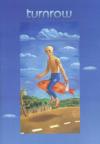|
Rehearsing Our Audience with the Infinite: Notes on Poetry & Related Matters
William Pitt Root
Traditionally the swan is a poetic emblem, the goose a barnyard watchdog. So just what is a swan but a goose with gold-plated PR and the presumption of class? And is the smooth gliding progress of a well-wrought poem not propelled by the churning, just below that reflective surface, of webbed feet caked in dung?
Success in the craft of poetry as in the art of strip-tease is, in equal parts, the suggestion of what is hidden and the inaccessibility of what is disclosed.
We don't look into a poem for the poet—we look there for lost parts of ourselves.
"I write poems because I've never learned to play blues harmonica or flamenco guitar, and I've had to make words my instruments or be riddled with the silences of a music I could not otherwise tell." Since this remark of mine first appeared in print, twice students have given me harmonicas. I love them for their literalism, bless them for gifting me, and still hope for a Spanish guitar.
Vowel sounds are made nearest the heart, starting from the lungs and gushing upward and out; consonants, on the other hand, are made at the interface between self and non-self, at the front of the mouth—lips, teeth, tip of tongue. Vowels then are pure feeling-sound, a matrix sculpted into thoughts only by torturously intricate deformation during exit. Hog-callers, poets, singers, lovers, cantors, muezzins— vowel-howlers, one and all.
Ultimately isn't it the mind's artesian capacity to overflow all forms that drenches existence with such significance as keeps us from drying out en route to the conclusion of each life's sentence?
To the literalist anything that moves is moving.
Personality and character: The first we develop to get along with our fellow human beings, the second to get along with our secret gods. It isn't difficult to tell which poets have gods to deal with and which are content with social devotions.
We do not bring the wolf into our living room unless it is domesticated, nor do the impulses behind a poem find a place in polite society until they, too, are muzzled—or taught to display their fangs only in a classic grin.
Twentieth century assumptions about the legitimacy of detachment, which have made criticism respectable in our world, would constitute, in any indigenous culture on the face of the earth, a state of unbelief so profoundly, glaringly in error that the practitioner would be instantly forbidden from any further dealings with the spirits a.k.a. the arts.
Light is obedient to laws of refraction and reflection. Vision is subservient to the heart's ability to bear what it has seen.
Syntax just may be the most intimate aspect of a poet's work, for it is there—more than in image, idea, or diction—that we learn most directly, as from the caress of a lover's hand, both the complexities of a mind and the convolutions of grace in a spirit.
Poetry enchants reason in all its fetters with imagination in all its freedom. As a woman with the gift of dance ensorcels the stockbroker, as the sea embraces the rocky coasts. Even as the hunting cat, all business, is enchanted by the bird, all grace.
In any culture where people would rather hear songs than sing them, no wonder commerce replaces community, and idolatry succeeds creativity.
The too earnest flog an art of unimaginative candor.
As Blake so famously declared, "The eye is the window to the soul." It's no accident that the word for our organ of vision and the word for our first person singular are homophones, sound-alikes: eye and I. The more we see the more we are, and the more we are the more we become a part of what we see. That the sense of individuality and the sense of co-existence increase proportionally is only apparently a paradox. To explore individuality to its ultimate stages is to lose all sense of separateness from what we sometimes are encouraged to think of as the Other, the non-Self.
By illusions we may not learn Truth so much as what it is in our lives that rings most true.
Life as we come to know it is a figment entirely of the imagination. No one is unimaginative but few experience awareness of that essential creativity any more than they do of their production of new blood cells from their innermost marrow.
If in dreams we rehearse our audience with the infinite, in the arts we merely knock upon the gate.
|








